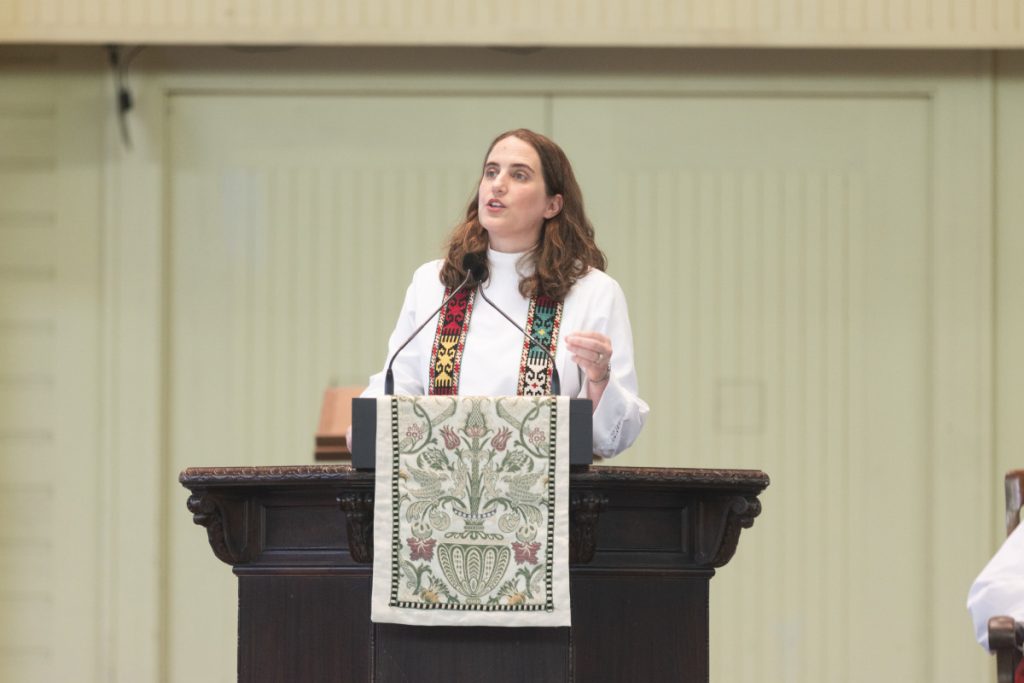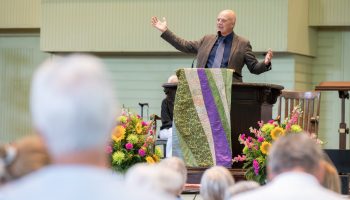
The Rev. Leyla King delivers her sermon “Reasons to dance” Sunday in the Amphitheater.
“The Hopi people say ‘to watch us dance is to hear our hearts speak.’ As a Palestinian-American, I know this to be true in my bones. When I hear the drumbeat of our traditional dance, the dabke, I dance as my mother and grandmother danced,” said the Rev. Leyla King.
King preached at the 10:45 a.m. Sunday morning worship service in the Amphitheater. Her sermon title was “Reasons to Dance,” and the scripture readings were 2 Samuel 6:1-5; 12-16 and Mark 6:14-29.
The dabke is a dance of joy at every wedding, King said.
“The drumbeat also helps us dance out our pain and sorrow about the Ottoman Empire, the British Mandate and the Israeli State,” she said. “The drumbeat is our dance of hope, that one day we will be free. As the Hopi, so the Palestinian — when you watch us dance, you hear our hearts speak. Dance transcends the limits of mere words and takes us to the depths of healing.”
When King was invited to preach at Chautauqua, she was given the option to preach from any text in the Bible. Why did she choose such bizarre texts?
“I freaked out when given the opportunity to pick any Biblical text because I am an Episcopalian and we follow the lectionary, the three-year cycle of readings. I never had to choose my own text,” she said.
She continued, “Second, I know the Book of Common Prayer (of the Episcopal Church) better than the Bible. So I fell back on the three-year cycle, and so you get David dancing before the Ark of the Covenant and Herodias’ daughter dancing before Herod.”
The texts may be bizarre, but at least bizarre is interesting, King said. The dance of faith is with God; alone; with each other; and with the whole community of faith.
David danced with jubilation in bringing the presence of God in the Ark of the Covenant into Jerusalem. David’s dance was passionate and life-giving.
In Mark’s Gospel, the daughter of Herodias, often called Salome, danced for her stepfather and his guests. When Herod offers her anything as a reward for the dance, Salome turned to her mother.
“Salome was not intending to manipulate Herod, but she conspired with her mother in John’s death,” King said. “She added her own twist asking for his head on a platter.”
David’s dance was life-giving and Salome’s was death-dealing, said King, but before holding David up too much, “we need to know that David only brings the Ark to Jerusalem when he sees that those who were keeping it have been blessed by God in many earthly ways.”
Michal, one of David’s wives and the daughter of Saul, looked at David dancing and despised him. King noted that later in the story, Michal accused David of uncovering himself to show off to the maids who were watching.
David did not deny the attention-seeking, or looking for favor from others. He told Michal that he would debase himself to others as he wanted, but the maids held him in honor. His acts solidified his power and his claim to the throne.
King said, “David and Salome are not all that different. Their motivations are complex and their outcomes are manifold. To watch them dance is to hear what their hearts speak.”
She continued, “If we consider standing up and sitting down as dancing, then worship is a kind of dance. We use our bodies and voices to speak to and about God. We bodily worship in this space and we embody the praise of God and speak faith to ourselves and God.”
Worship is meant to be life-giving but often we find ways to be death-dealing, King told the congregation.
“This is God’s dance hall,” she said. “Are we here for praise, or more selfish reasons? Are we here for pardon but not renewal? To use God for our own purposes, and forget the real purpose (of worship) is to learn how God can best use us?”
King told the congregation that “we will gather around the drumbeat of scripture and prayer and bring that into worship, into God’s life-giving dance. Whatever we bring to the dance, God offers us the opportunity to dance with God’s amazing grace.”
She asked the congregation, in the midst of the tumult of the world and the violence of political rhetoric, how do “we engage our whole selves, to join in the dance of praying not only for what God provides us but what transforms us into God’s one holy people for God’s purpose, to inspire the world to join the dance?”
The Rt. Rev. Eugene Taylor Sutton, senior pastor for Chautauqua Institution, presided. Sherra Babcock, former vice president and Emily and Richard Smucker Chair for Education at Chautauqua Institution, read the scriptures. For the prelude, Joshua Stafford, director of sacred music and the Jared Jacobsen Chair for the Organist, played “Prelude, Fugue and Chaconne,” BusWV137 by Dietrich Buxtehude on the Massey Memorial Organ. The Chautauqua Choir performed “Salmo 150,” by Ernani Aguiar, for the anthem. The choir sang a cappella under the direction of Stafford. The offertory anthem, sung by the Chautauqua Choir under the direction of Stafford and accompanied by Rees Taylor Roberts on the Massey Organ, was “Lord of the Dance,” music by John Bertalot, words by Syndney Carter. For the postlude, Stafford played “The Emperor’s Fanfare,” by Antonio Soler, arranged by E. Power Biggs on the Massey Organ. Support for this week’s chaplaincy and preaching is provided by the Alison and Craig Marthinsen Endowment for the Department of Religion.




